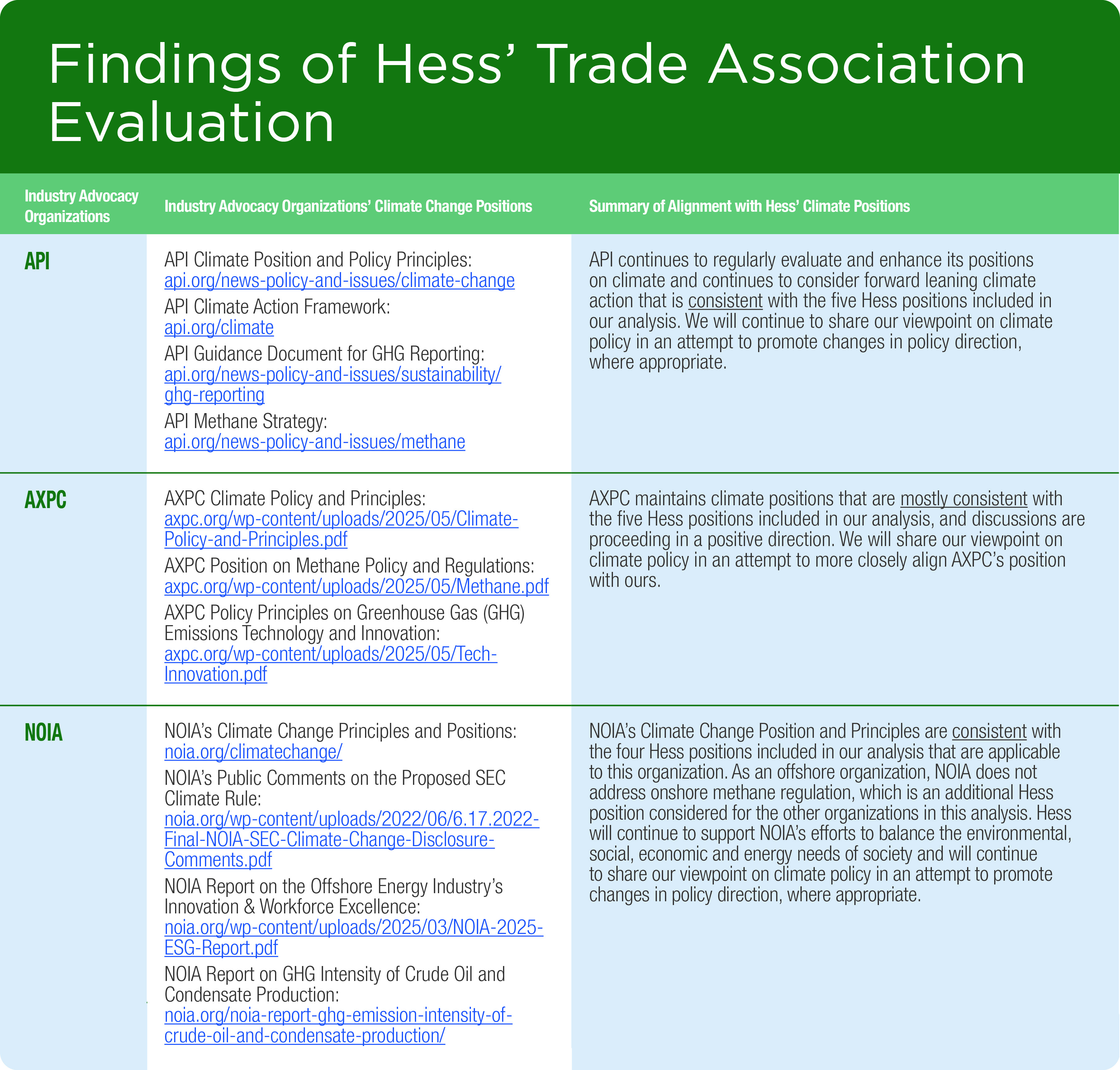Hess is a member of many associations, organizations and collaborative working groups. Although many of these associations, organizations and collaborative working groups share Hess’ positions on key issues, including climate change, our positions do not always align with all positions of these groups, and our membership, as well as our findings of alignment as described on the next page, should not be considered a direct endorsement of the entire range of activities that they undertake or have previously undertaken. However, these organizations often provide broader value to our company in the form of industry standards, along with opportunities to promote continuous improvement in our sustainability performance and transparency through industry led voluntary programs. In addition, decisions by Hess to become a member or to discontinue a particular membership or relationship with an organization are made based on a variety of factors and should not be solely attributed to alignment or misalignment on any one issue.
In 2024, we continued our ongoing efforts to review and support updates to association positions so that they more closely align with our positions, including on climate change and methane emissions. To ensure clarity of our company’s stance on climate change including methane, we publish our positions on these issues on our website.
To illustrate our alignment on climate change policies with our national and international memberships and associations, we evaluated the major advocacy organizations that received more than $50,000 from Hess in 2024.
Our most recent evaluation, conducted in 2024, was based on publicly available key positions and statements, along with our own assessment of each organization’s activities regarding climate change and whether their climate positions are consistent with the following Hess positions: (1) support for the Paris Agreement’s aim to limit global average temperature rise, (2) acknowledgment of the need to accelerate greenhouse gas (GHG) emissions reductions through technological innovation, (3) support for a carbon price applied to emitters across all sectors, (4) support for the direct regulation of methane and (5) support for standardization of climate related disclosures.
All of the organizations we analyzed support GHG emissions reductions through technological innovation and support standardization of climate related disclosures, and both the American Petroleum Institute (API) and the American Exploration and Production Council (AXPC) – the two organizations that advocate on behalf of onshore climate and methane issues – have publicly indicated support for targeted and durable methane regulation. Although AXPC has not directly or publicly supported the aim of the Paris Agreement or a carbon price, it has established public principles that demonstrate thoughtful consideration of these issues and a willingness to work with all stakeholders as these policies are further developed. Further, as AXPC has publicly indicated a willingness to support direct regulation of methane through its comments on the Environmental Protection Agency’s (EPA) proposed methane rules and its continued engagement with EPA to improve the rule after it was issued, we have considered them “consistent” with Hess on this issue. Overall, we now consider AXPC to be “mostly consistent” with Hess’ positions. The National Ocean Industries Association (NOIA) has not addressed the direct regulation of onshore methane emissions, but as an offshore-only trade association this criterion is not applicable to it. With respect to our criterion on climate disclosure standardization, we feel that NOIA’s public comments on the U.S. Securities and Exchange Commission’s proposed climate disclosure rule were constructive and generally supportive of meaningful transparency while also representing an effort commensurate with the organization’s size and purpose. Therefore, we continue to view NOIA as “consistent” with Hess’ climate positions overall.
We continue to review the positions of our major advocacy organizations on an ongoing basis, and in the event that those positions appear to be or become misaligned with Hess’ positions, we share our viewpoint in an attempt to more closely align their position with ours.
